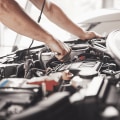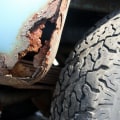Engine Noise Increased engine noise is a common sign of an exhaust leak. Listen for a loud noise, especially when accelerating. You may also hear intermittent clicking or whistling noises while the engine is running. The most common sign of an exhaust gas problem it's the strange noises.
If your car makes a whistle, rattle or click, it's likely due to a leak or a broken muffler or exhaust pipe. You may also hear a deep or low growl when the system is clogged with dirt or broken parts. As the engine pumps these gases, the exhaust manifold collects them from each cylinder and directs them to a single pipe. From there, gases flow through the catalyst, which contains special catalysts that help convert harmful emissions into less toxic substances.
The gases then pass through the resonator, helping to reduce engine noise and vibrations. Finally, the gases enter the silencer, where they are dispersed and expelled through the exhaust pipe. If you notice unusual or excessive vibrations in the steering wheel, accelerator, or seat, it's likely due to a problem with the exhaust system. A common culprit is a rusty exhaust pipe, something that is frequently seen in vehicles that are primarily used for short trips.
When you take short trips, the muffler and exhaust pipe don't get hot enough to evaporate the moisture that builds up in the system. Condensation will settle in the system and, over time, may cause corrosion. Another common cause of excessive vibrations is exhaust gas leaks. In either case, it's important to inspect and repair the system promptly to avoid more costly repairs or safety issues. When it comes to engine noise, there are several possible causes, but a common culprit is often a leak in the exhaust system.
If you hear a loud noise in the engine that goes up and down with the vehicle's revs, it's a clear indication that there is likely a leak in the exhaust manifold or in one of the gaskets of the exhaust system. Once again, it's important to treat exhaust leaks promptly to avoid risks to your health and that of your passengers. Another type of noise that can indicate exhaust problems is a whistle or a click while the engine is running in progress. These sounds may indicate an obstruction in the exhaust system, causing abnormally high backpressure.
If you hear whistles or clicks, it's important to watch for other signs of problems, such as discolored and burned wires or spark plug boots or burnt paint near the exhaust holes in the cylinder head. Another odor that indicates a problem in the exhaust system is the smell of gasoline inside the car. When one of the exhaust pipes is damaged and leaking, gas vapors, along with other exhaust gases, exit through the opening. These noxious vapors can enter the cabin, where you and your passengers can inhale them.
Because of safety risks, gas odors should never be ignored; schedule an appointment to have the issue addressed immediately. When there's a problem with the exhaust system, you're likely to notice an impact on the vehicle's performance. One of the most common causes of performance problems is a problem with the catalyst, which can cause difficulties during start-up and a decrease in acceleration power. Exhaust leaks can also contribute to performance problems because they interrupt the proper flow of exhaust gases and affect overall engine efficiency and performance.
They know they have to take it to the garage if they have problems and they know that they have to book a regular tire rotation and oil change service to properly maintain their car, but when it comes to the exhaust system, most people don't know how it works or how to know if it has serious problems. As a car owner, it's critical to understand the common signs of exhaust problems to avoid costly repairs and maintain vehicle efficiency. Keep reading to learn what the purpose of your car's exhaust system is and how to identify signs and symptoms that the exhaust system isn't working as it should, as well as what to do if you suspect there's a problem with your car's exhaust system. You may need to replace or repair a leaking exhaust gasket or a damaged catalyst to prevent engine damage and carbon monoxide poisoning. By knowing the common signs of exhaust problems, you can ensure that your car is in excellent condition and that minor problems don't turn into costly repairs.
Driving on poor roads can cause the exhaust system to suffer shocks and shocks, which can cause holes and structural components to weaken, while damage caused by oxidation and corrosion to parts of the exhaust system are perfect places for exhaust gas leaks to form. In addition, if one of the hooks that hold the exhaust system falls off or the rubber insulating section is excessively worn, other parts could weaken or be damaged when rebounding and generating more vibrations and impacts during the operation of the vehicle.











